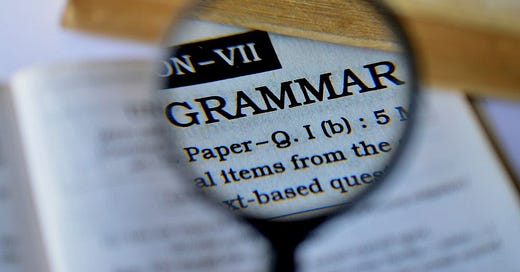This is part four of MartyG Reports’ series on common English faux pas and how to avoid them. A full syllabus is available at this link here.
As always, special attention has been paid to issues that Microsoft Word can not or may not always catch for you.
“Never End a Sentence With a Preposition.”
A preposition connects two things: 1) the part of the sentence before the preposition and 2) the object that follows the preposition. For example: Mike danced with Sally. (The preposition “with” connects “danced” to “Sally.”)
A preposition without an object is improper. And, because a preposition that ends a sentence always lacks an object, it is improper to end a sentence with a preposition, or two or more of them, as Special Agent Bork did in Beavis and Butt-Head Do America:
Sometimes the preposition at the end may simply be removed. Consider the following:
The lawyer had only one case to cite to.
The last preposition was superfluous:
The lawyer had only one case to cite.
Other times the preposition may be moved. Take this example:
Oblivious to the snakes in the pit, he jumped in.
It may be rectified like this:
Oblivious to the snakes in the pit, in he jumped.
Also, many verb-preposition pairs have corresponding single-word verbs, so the problem may often be addressed by substitution. Consider the following sentence:
The parable was one he had heard of.
The preposition may be removed and the sentence shortened by two words:
The parable was one he knew.
More generally, sentences tend to end in prepositions when their structures were already flawed, starting at an earlier clause. Thus it is hard to find such a sentence that may not be more concisely and otherwise-better-written another way. Take this last example:
The document was the one thing he wanted to know about.
It is better formulated:
He wanted to know about one thing: the document.
This brings us to the next topic.
Use Affirmative and Direct Language
Readers prefer affirmative and direct language. Not only is it concise, which readers prefer on its own, but it is more understandable and credible than beating around the bush. Consider the following 16-word sentence:
It took multiple exposés for the public to start to understand the problem was not uncommon.
It is better written in 15 words as follows:
Multiple exposés were needed for the public to start to understand the problem was common.
Or better still, in 13 words—
The public needed multiple exposés to start to understand the problem was common.
Use the active voice, as in the last example, unless reason exists to use the passive voice.
Generally, “not common,” “not easy,” “not fair,” etc. are better written “uncommon,” “hard,” “unfair,” etc. Emphasis is an exception to this rule, e.g.,
Her own experience was not inconsiderable.
“Whether or not”
The word “whether” is almost always better on its own. Take the following business query:
Please let me know whether or not you want to proceed with the contract.
The words “or not” add only to the word count. They may be removed:
Please let me know whether you want to proceed with the contract.
But exceptions to this rule exist. The following sentence is one of them:
Whether or not lead poisoning was the cause, the Roman empire fell.
In this sentence, “Whether or not” emphasizes the definiteness of the conclusion, i.e. lead poisoning may or may not have caused the Roman empire to fall, but either way it fell. Removing “or not” would cloud rather than emphasize that definiteness.
Proper Capitalization
Leaving everything in lowercase is increasingly common today, especially in some places where it has become specifically customary, such as text messaging and Instagram (a platform that, in fact, capitalizes its own first letter). But many words may be either a proper noun or something entirely different, depending solely on capitalization.
The difference is sometimes stark. John is a man. But the john is a toilet and a john may be arrested for solicitation.

The fact remains that proper capitalization is the difference between helping your Uncle Jack off a horse and helping your uncle…





Totally agree about proper capitalization. Thanks for the laugh. Similarly, I can't stand it when people capitalize words that shouldn't be.
... okay